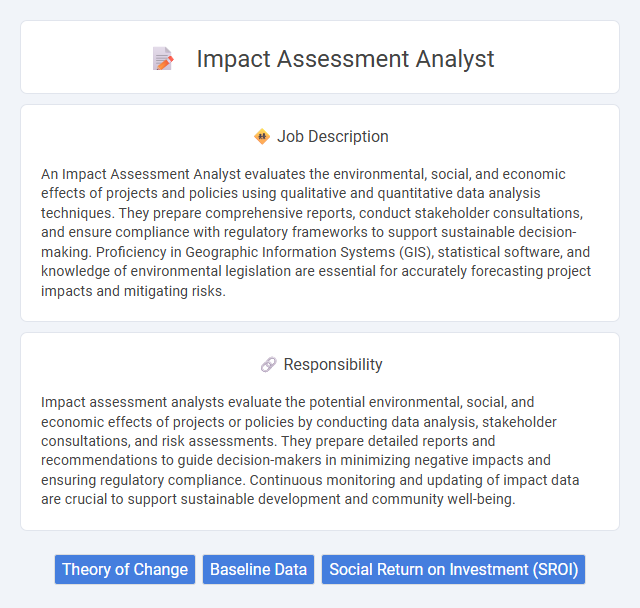
An Impact Assessment Analyst evaluates the environmental, social, and economic effects of projects and policies using qualitative and quantitative data analysis techniques. They prepare comprehensive reports, conduct stakeholder consultations, and ensure compliance with regulatory frameworks to support sustainable decision-making. Proficiency in Geographic Information Systems (GIS), statistical software, and knowledge of environmental legislation are essential for accurately forecasting project impacts and mitigating risks.
Individuals with strong analytical skills and attention to detail are more likely to be suitable as impact assessment analysts. Those comfortable working with data, conducting research, and evaluating environmental or social effects might find this role well-aligned with their abilities. However, people who struggle with critical thinking or managing complex information may face challenges adapting to the demands of this job.
Qualification
An Impact Assessment Analyst must possess strong analytical skills, typically supported by a bachelor's degree in environmental science, economics, or social sciences. Proficiency in data analysis software, Geographic Information Systems (GIS), and regulatory frameworks is essential to evaluate social, economic, and environmental impacts. Effective communication skills and experience in stakeholder engagement further enhance the ability to deliver comprehensive impact assessments.
Responsibility
Impact assessment analysts evaluate the potential environmental, social, and economic effects of projects or policies by conducting data analysis, stakeholder consultations, and risk assessments. They prepare detailed reports and recommendations to guide decision-makers in minimizing negative impacts and ensuring regulatory compliance. Continuous monitoring and updating of impact data are crucial to support sustainable development and community well-being.
Benefit
An Impact Assessment Analyst likely evaluates data to determine the potential effects of projects or policies, helping organizations make informed decisions. Their work probably enhances risk management and sustainability strategies by identifying environmental, social, and economic impacts. This role is expected to add value by ensuring regulatory compliance and supporting long-term organizational goals.
Challenge
The role of an impact assessment analyst likely involves navigating complex data sets to evaluate potential environmental and social effects of projects, which can be challenging due to the unpredictability of variables and stakeholder interests. Analysts probably face difficulties in balancing quantitative analysis with qualitative insights to provide comprehensive risk assessments. Managing tight deadlines while ensuring regulatory compliance might also present significant challenges in this dynamic field.
Career Advancement
Impact assessment analysts develop expertise in evaluating environmental, social, and economic effects of projects, positioning themselves for roles in sustainable development and corporate responsibility. Mastery of data analysis tools and regulatory frameworks accelerates progression to senior analyst or management positions. Experience in multidisciplinary collaboration and reporting enhances chances for leadership roles in consulting firms or public agencies.
Key Terms
Theory of Change
An Impact Assessment Analyst specializes in evaluating project outcomes by applying the Theory of Change framework to map inputs, activities, outputs, and long-term impacts. This role involves designing and implementing indicators that measure causal links between interventions and observed social, environmental, or economic changes. Expertise in data analysis and stakeholder engagement ensures accurate assessment of program effectiveness and supports strategic decision-making.
Baseline Data
Impact assessment analysts specialize in collecting and analyzing baseline data to establish reference points for environmental and social conditions before project implementation. Accurate baseline data enables the identification of potential impacts and supports the development of mitigation strategies. Proficiency in data collection methods, statistical analysis, and reporting tools is essential for producing reliable impact assessments.
Social Return on Investment (SROI)
Impact assessment analysts specializing in Social Return on Investment (SROI) evaluate the social, environmental, and economic value generated by projects or organizations, translating outcomes into quantifiable financial metrics. They utilize rigorous data collection, stakeholder engagement, and impact mapping techniques to measure social impact and forecast value creation. Their insights inform decision-making, optimize resource allocation, and enhance organizational accountability by demonstrating tangible social benefits relative to investments made.
 kuljobs.com
kuljobs.com